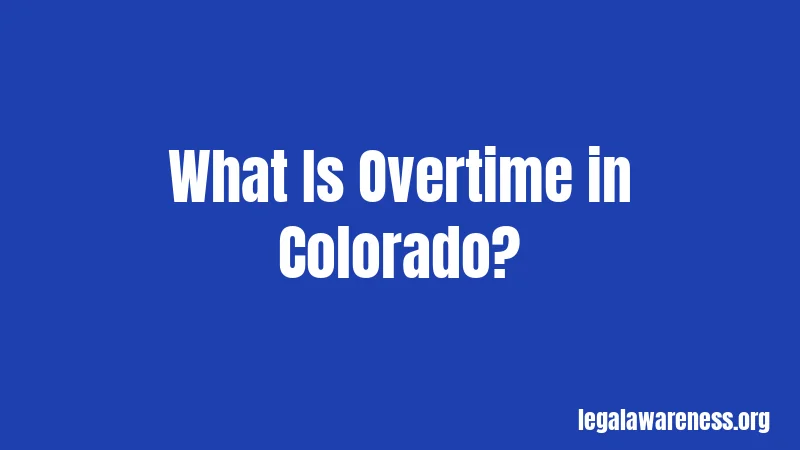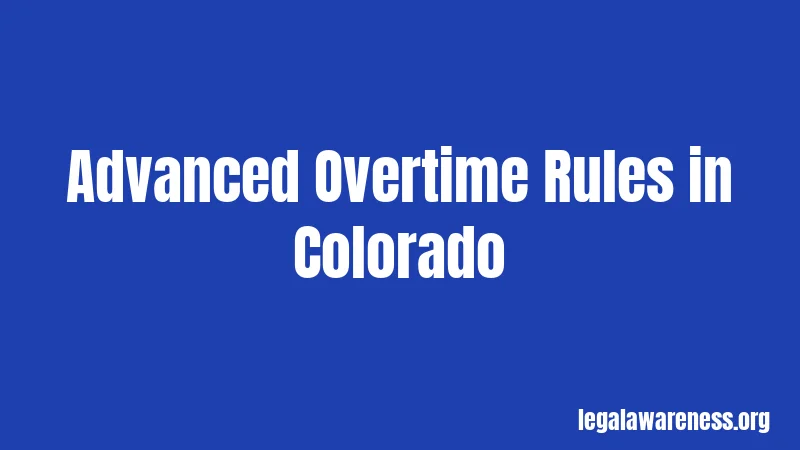Colorado Overtime Laws in 2026: What You Actually Need to Know
Here’s something that surprises most people: Colorado has some of the strictest overtime laws in the country. Many workers don’t realize they might be entitled to extra pay. Even more employers get this wrong. This article breaks down exactly what Colorado law says about overtime. No confusing legal jargon. Just the facts.
If you work in Colorado, you need to understand these rules. Whether you’re an employee fighting for fair pay or an employer trying to follow the law, this guide covers everything. Let’s dig in.
What Is Overtime in Colorado?

Overtime is extra pay you get for working extra hours. In Colorado, it’s pretty straightforward. You work more than 40 hours in a week? You’re entitled to overtime pay. Pretty simple, right?
But here’s where Colorado gets interesting. The state actually has rules that are MORE generous to workers than federal law. That means if federal law and Colorado law conflict, employees get the better deal. That’s actually a good thing if you’re the one working.
Colorado doesn’t just stop at the basic 40-hour rule either. The state has additional overtime requirements that many people miss. We’ll cover those in detail.
Basic Colorado Overtime Rules
The 40-Hour Rule
This is the main one. Work 40 hours or less in a week? No overtime pay required. Work over 40 hours? Your employer has to pay you overtime for every hour over 40.
Okay, pause. This is important. The 40-hour week starts on Sunday and ends on Saturday in Colorado. Your employer might use a different schedule, but the law still applies. Hours worked are hours worked, no matter when your company counts them.
The overtime rate in Colorado must be at least 1.5 times your regular hourly wage. So if you normally make $20 an hour, overtime pays at least $30 an hour. That’s the law. No exceptions.
Not sure if your paycheck is calculated correctly? Do the math. Add up your hours for the week. Multiply anything over 40 by 1.5 times your base rate. That’s what you should get.
Daily Overtime Requirements
Hold on, because this is where Colorado gets even stricter than federal law. In Colorado, you’re also entitled to overtime for hours worked beyond 12 in a single day. That’s in addition to the weekly overtime rule.
Let me break that down. Say you work 14 hours on Monday. You get 1.5 times pay for hours 13 and 14. Even if you only worked 30 hours total that week, you still get the daily overtime. It’s basically the best-case scenario for workers. You’re protected both ways.
There’s more. If you work more than 12 consecutive hours in a day, Colorado law kicks in. This applies whether you’re salaried, hourly, or classified some other way. The hour of work is the hour of work.
The Day of Rest Rule
Here’s one people definitely don’t know about. In Colorado, if you work seven consecutive days without a day off, you get overtime pay for the seventh day. Just for working that seventh day, even if you only worked four hours.
This seems wild to some people. But Colorado takes it seriously. Your employer has to give you one day off per week. If they don’t, you get overtime pay for working that seventh consecutive day. The rate is the same: 1.5 times your regular wage.
That’s actually the part most people miss. You could work 25 hours that week, spread across seven days. You’d get overtime pay just for working the seventh day. Stay with me here. This protects workers from exploitation.
Advanced Overtime Rules in Colorado

Shift Changes and Averaging
Some employers try to average hours across multiple weeks to avoid paying overtime. Colorado doesn’t allow that in most situations. Each week stands on its own. Your employer can’t tell you “Well, you worked 50 hours last week and 30 this week, so we’ll call it 40 per week.”
Nope. If you work 50 hours one week, you get overtime for those 10 hours. If you work 30 hours the next week, that’s just 30. The averaging trick doesn’t work in Colorado.
Now, there are a few situations where some flexibility exists. Certain jobs in specific industries might have different rules. But as a general rule, weekly averaging is not allowed. Your hours are your hours.
Comp Time Instead of Overtime
Wondering if your employer can give you time off instead of paying overtime? Confused about the difference? Let me break it down.
In Colorado, for most private sector workers, the answer is no. Your employer can’t force you to take comp time instead of overtime pay. You work overtime hours, you get overtime pay. That’s the deal.
Public sector employees are a bit different. Government employers sometimes have different rules about comp time. If you work for a city, county, or state agency, those rules might apply differently. But if you work for a private company, you’re getting paid overtime. Not comp time.
Exempt Employees
Not everyone gets overtime pay. Some jobs are “exempt” from overtime rules. Basically, your employer doesn’t have to pay you overtime if your job qualifies for an exemption.
These exemptions are pretty narrow in Colorado. You’re typically exempt if you’re in an executive, administrative, or professional role. Sales employees in certain situations can also be exempt. But the rules are strict about who qualifies.
Here’s where it gets important. Your job title doesn’t matter. Your employer can’t just call you “management” to avoid paying overtime. The actual duties you perform determine if you’re exempt. You could be called a manager but still get overtime if your daily work doesn’t match the legal definition.
Make sense, right? It’s about what you actually do, not what your business card says.
Piece Rate and Commission Pay
Some workers get paid per item produced or per sale made. How do overtime rules apply to you? Good question.
Colorado requires overtime pay even for piece rate and commission workers. You calculate your regular rate of pay based on your earnings divided by hours worked. Then overtime is 1.5 times that rate for all qualifying hours.
This gets complicated. Honestly. If you’re paid this way, you might want to have a conversation with your employer or an employment lawyer to make sure the math is right. It’s not simple, but the law definitely applies.
Penalties for Overtime Violations
So what happens if your employer doesn’t pay overtime? This is where things get serious.
First, you can file a complaint with the Colorado Department of Labor and Employment. They investigate and can force your employer to pay what you’re owed. That’s the back pay you earned.
But it doesn’t stop there. Colorado law allows you to sue your employer for overtime violations. And if you win, the penalties are substantial. You can recover unpaid overtime wages, plus interest. You can also get liquidated damages, which means an amount equal to the unpaid wages again. Basically, you could get double the money owed.
Wait, it gets better. If your employer violated the law knowingly or recklessly, you might recover attorney’s fees too. That means you don’t have to pay a lawyer out of pocket. Your employer might have to pay for the lawyer fighting them.
Beyond monetary penalties, violations can damage an employer’s reputation. Word gets out. Employees don’t want to work there. Customers might not want to do business there. The costs add up fast.
Special Circumstances and Exceptions

Agricultural Workers
Agricultural workers have some different rules. Honestly, this is one area where Colorado’s protections are weaker than they could be. Farm and ranch workers don’t always get the same overtime protections as other workers.
If you work in agriculture, you still get some protections, but they’re not as strong. Definitely look into your specific situation if you work in farming or ranching.
Domestic Workers
Domestic workers, like nannies or housekeepers, used to have fewer protections. In recent years, Colorado has expanded overtime rights for domestic workers. Many household employees now qualify for overtime pay.
This has changed recently, so if you do domestic work, it’s worth checking into. You might have rights you didn’t know about.
Oilfield and Certain Seasonal Workers
Some jobs in oil and gas extraction have slightly different rules. Certain seasonal workers might have different requirements too. The basic 40-hour rule still applies, but there are some nuances.
If you work in oil and gas or seasonal industries, check with your employer or the Department of Labor. These rules can be tricky.
Teenagers and Minors
Minors have their own overtime rules in some cases. Actually, federal law is more protective for minors than Colorado law in certain situations. So federal rules might apply instead.
If you’re under 18, talk to your employer about your specific overtime rights. The rules can be different.
How to Protect Your Overtime Rights
Track Your Hours
Here’s the most important thing you can do: keep your own records. Write down what time you start and stop work every single day. Use your phone, a notebook, a spreadsheet, whatever works.
Your employer is legally required to keep accurate time records. But keeping your own backup copy protects you. If there’s ever a dispute, you have proof. Even handwritten notes with dates and times count as evidence.
Check Your Paychecks
Actually, this one’s pretty straightforward. Look at your paychecks carefully. Make sure overtime hours are listed separately from regular hours. Verify that overtime hours were paid at 1.5 times your regular rate.
Many paycheck errors are just mistakes. Bring them to your employer’s attention in writing. Email is perfect because you have proof you reported it. Most employers will fix honest mistakes.
Know the Minimum Wage
Colorado’s minimum wage is $15.00 per hour as of 2025. Your overtime rate is calculated based on your actual hourly wage, not the minimum wage. But if your employer is paying you less than minimum wage, everything is wrong.
Most Colorado employees make at least minimum wage. But some do get paid less illegally. If that’s you, overtime calculations are off too.
File a Complaint If Needed
If your employer won’t fix overtime violations, you can file a formal complaint. The Colorado Department of Labor and Employment handles these complaints. You can file online, by phone, or in person.
The process is free. You don’t pay anything to file. The state investigates on your behalf. They can force your employer to pay you what you’re owed.
Consider Legal Help
For serious or ongoing violations, talking to an employment lawyer makes sense. Many lawyers work on “contingency,” which means they get paid only if you win. You don’t pay upfront.
An initial consultation is often free. A lawyer can review your specific situation and tell you if you have a case. Trust me, this advice alone can save you thousands.
Frequently Asked Questions
Can my employer make me work overtime?
Yes, in most situations. Your employer can require overtime, and if you refuse, they can discipline you or fire you. But you must be paid overtime rates for those hours. The payment is not optional.
Does working through lunch count toward my 40 hours?
It depends. If your employer requires you to work through lunch, it counts as work time and goes toward your 40 hours. If you choose to work through lunch on your own, it usually doesn’t count. Check with your employer about their policy.
What if I’m salary instead of hourly?
Salary doesn’t exempt you from overtime unless your job qualifies for an exemption. Even salary employees get overtime pay in Colorado if their job doesn’t meet the exempt criteria. Your salary might be divided by hours worked to figure your hourly rate.
Do I have to work holidays?
Your employer can require you to work on holidays. If you do, it counts toward your 40 hours. If you work over 40 hours that week, holiday hours are included in the overtime calculation.
How far back can I claim unpaid overtime?
In Colorado, you can typically go back three years. That means if your employer owes you overtime from three years ago, you can still pursue it. After three years, it gets more complicated legally.
Final Thoughts
Colorado takes overtime seriously. The state protects workers more than many other states do. Now you know the basics. Daily overtime, weekly overtime, the day of rest rule. These rules exist to protect you from overwork and exploitation.
If you think your employer is violating overtime laws, don’t ignore it. Talk to someone. File a complaint. Get legal advice. You have rights, and the law backs you up.
Stay informed. Track your hours. Check your pay. When in doubt, look it up or ask a lawyer. You’ve got this.
References
Colorado Department of Labor and Employment – Overtime and Hours of Work
Colorado Wage Act – C.R.S. 8-4-101 et seq.
Fair Labor Standards Act – Federal Overtime Requirements
